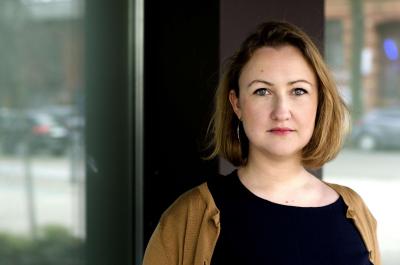Emilia Smechowski

The search for her Polish identity, including the process of accepting it, has taken a long time. She confesses to feeling German when she was a young girl, because everything Polish in her family was repressed from consciousness. Only after a while did she become aware of successful people of Polish origin. The first two were the famous footballers Miroslav Klose and Lukas Podolski. During her studies she got to know other Poles with a similar past. She understands that her migration experience is a kind of ‘multiplied biography’ for the tens of thousands of children who came to Germany from Poland in the late 1980s and early 1990s. “As soon as I outed myself, I saw other Poles everywhere. Suddenly it seemed that almost everyone in Germany had Polish ancestors. Even the Chancellor.”[6]
Smechowski, however, had noticed the invisibility of the Poles much earlier, although she had not fully reflected on the matter. As early as in primary school she noticed that other foreigners were much more visible.“Not only because they looked different. But also because they continued to live part of what was home to them. (...) Croatian mothers raved about their summer houses on the Adriatic. Turkish mothers shelled sunflower seeds together on the square and brought homemade borrek to the school festival. My mother never would have thought of cooking bigos. She baked a quiche.”[7]
And when she began her career as a journalist, she noticed how naturally her colleagues, who had immigrated to Germany from Turkey as children, talked about their origins. Some of them had even been born in Germany, but still had a very natural attitude towards their origins and the maintenance of their family traditions. As a result, Smechowski experienced a turning point in her search for her own identity during her pregnancy, for during this time, Emilia Smechowski decided to return to speaking Polish. She is certain that her family's immigration history will be lost forever in the next generation if she does not cultivate this language with her daughter. As she herself says, she is attempting a partial “de-assimilation”. She is not so much interested in artificially discarding her German experiences in order to become Polish once again: it's more about refusing to hide that part of her earlier personality any more.
The integration debate, which Smechowski takes up in her book, refers not only to the wave of Polish migration to Germany in the 1980s and 1990s. Problems with the assimilation and “visibility” of foreigners are still topical, especially today against the background of the refugee crisis. “It took decades, but at some point a new reality came to light: Germany is a country of immigration. There are now even politicians who want to enshrine ‘integration’ as a state objective in the Basic Law, like environmental protection in 1994 and animal protection in 2002.”[8]
With all this in mind, however, the author notes that integration is not just a state task but also a private matter. And although the number of migrants living in Germany reached a temporary peak in 2017 (according to the Central Register of Foreigners there are over 10,000,000 [9]), the paradigm still applies: a good foreigner is an invisible foreigner. "If they are visible, they are usually perceived as a problem. Ethnic diversity still seems to be a symbol of failed integration," sums up Smechowski[10], who admits: the blame for this also lies with migrants from Poland, many of whom try to conceal their true origin at all costs.
Monika Stefanek, March 2018
Emilia Smechowski, Wir Strebermigranten, Verlag Hanser, Berlin 2017, ISBN 978-3-446-25683-5


![Anna Piasecka, author of the book “BIGOS, ZOB und JOB. Eine Polin in Deutschland”, [“BIGOS, ZOB and JOB. A Pole in Germany”], published in 2017. Anna Piasecka, author of the book “BIGOS, ZOB und JOB. Eine Polin in Deutschland”, [“BIGOS, ZOB and JOB. A Pole in Germany”], published in 2017.](/sites/default/files/styles/width_100_tiles/public/titelabbildung_piasecka.jpg?itok=67_NfMr7)